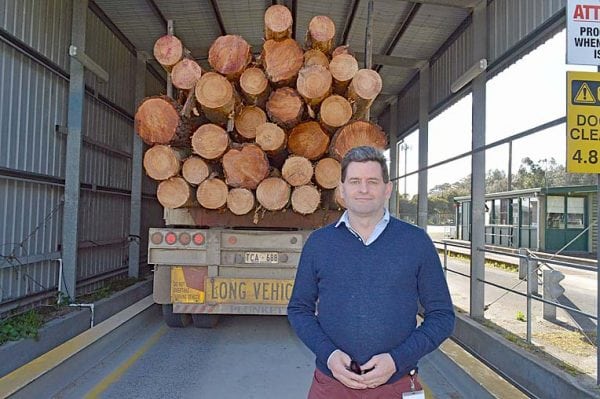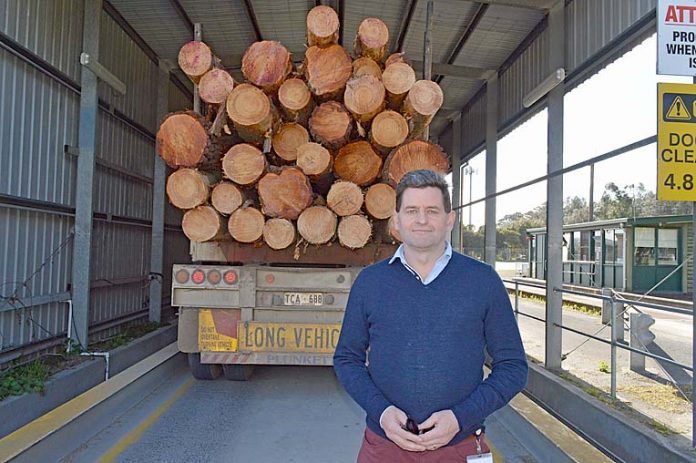
AN EXPORT log tariff to protect local industries and jobs should be considered by the Federal Government when devising its National Forest Industries Plan, Wattle Range Mayor Peter Gandolfi said yesterday.
“We must ensure we have a sustainable resource so local timber processors are able to access log,” he said.
“I would welcome such a plan if it leads to sustainability and job creating in our districts.
“Some form of export log tariff should be seriously considered.”
Mr Gandolfi’s remarks come after Prime Minister Malcolm Turnbull announced the NFIP at Parliament House in Canberra recently.
Mr Turnbull committed to the plan saying it would “underpin growth in the renewable timber and wood fibre industry” and give it the vision and certainty it needs.
He said government intended to develop the industry as a “growth engine for regional Australia”.
Regional Development Australia Limestone Coast chief executive officer David Wheaton told The Border Watch it was important to have Federal Government acknowledgement of the importance of the local industry.
He said the Green Triangle region had been at the leading edge of plantation forestry industry technology.
“The recent announcement of the establishment of a $6m forestry research and development hub in Mount Gambier will make it one of the major centres for forest industry research in the country,” Mr Wheaton said.
He said it was important to remember forestry was more than a primary industry, it was also a manufacturing industry.
It encompasses the whole value chain – from suppliers and sawmills to fabrication plants and retailers.
“The industry plays a major role as a direct employer, contributing to the state’s regional stability,” Mr Wheaton said.
“With 19pc of the national plantation estate, the greater Green Triangle is the largest forestry plantation area in Australia.
“It provides more than 4000 direct forest industry-related jobs and accounts for more than 15pc of Mount Gambier’s workforce.”
Mr Wheaton said a continuing local demand for sawn timber and panel was expected due to higher density living, house renovations, the increasing population and the emerging interest in timber buildings.
“Overseas, continued economic and population growth are expected to lead to a significant increase in demand for wood and paper products in Asia and the Pacific until at least 2030,” he said.
“The Asian demand can clearly be seen at the Port of Portland, which is the largest hardwood chip export facility in the world.”
Mr Wheaton said the NFIP should also have a role to play in creating a sustainable bioenergy future for the region.
“Future bioenergy demand will depend on a range of factors, including electricity and energy demand, carbon price, renewable energy incentives and the competitiveness of alternative renewable energy sources,” he said.
Member for Barker Tony Pasin said it was critical for policy makers to have a deep and objective understanding of the industry since it contributes over $22b to the Australian economy each year and employs more than 64,000 people in the forest, logging and processing sectors.
“My hope is the plan will be developed with input from a range of stakeholders with an objective of ensuring strong strategic growth in the industry across the chain,” he said.
“Importantly, I’m hoping the plan will include a strategy to ensure our forestry estates are expanded and log supply is increased to ensure the sustainability for mills that employ so many in the local industry.”
Mount Gambier City Council chief executive officer Mark McShane said any plan that has a focus on enhancing the timber industry from the forestry side to processing and investigation of value-added products will be beneficial to the region.
“Forestry and related timber industries are one of the largest economic drivers in the region and support a very large number of other industries,” he said.
“We must protect and expand this resource and industry.”
In related news, Australia’s forestry ministers have released a position statement which calls for the country to value and grow its forest industries.
The statement released by federal, state and territory governments states they all “strongly support Australia’s forest industries”.
Australian Forest Products Association chairperson Greg McCormack welcomed the statement saying forestry workers will take heart their federal and state leaders see a big sustainable future in all they do.








